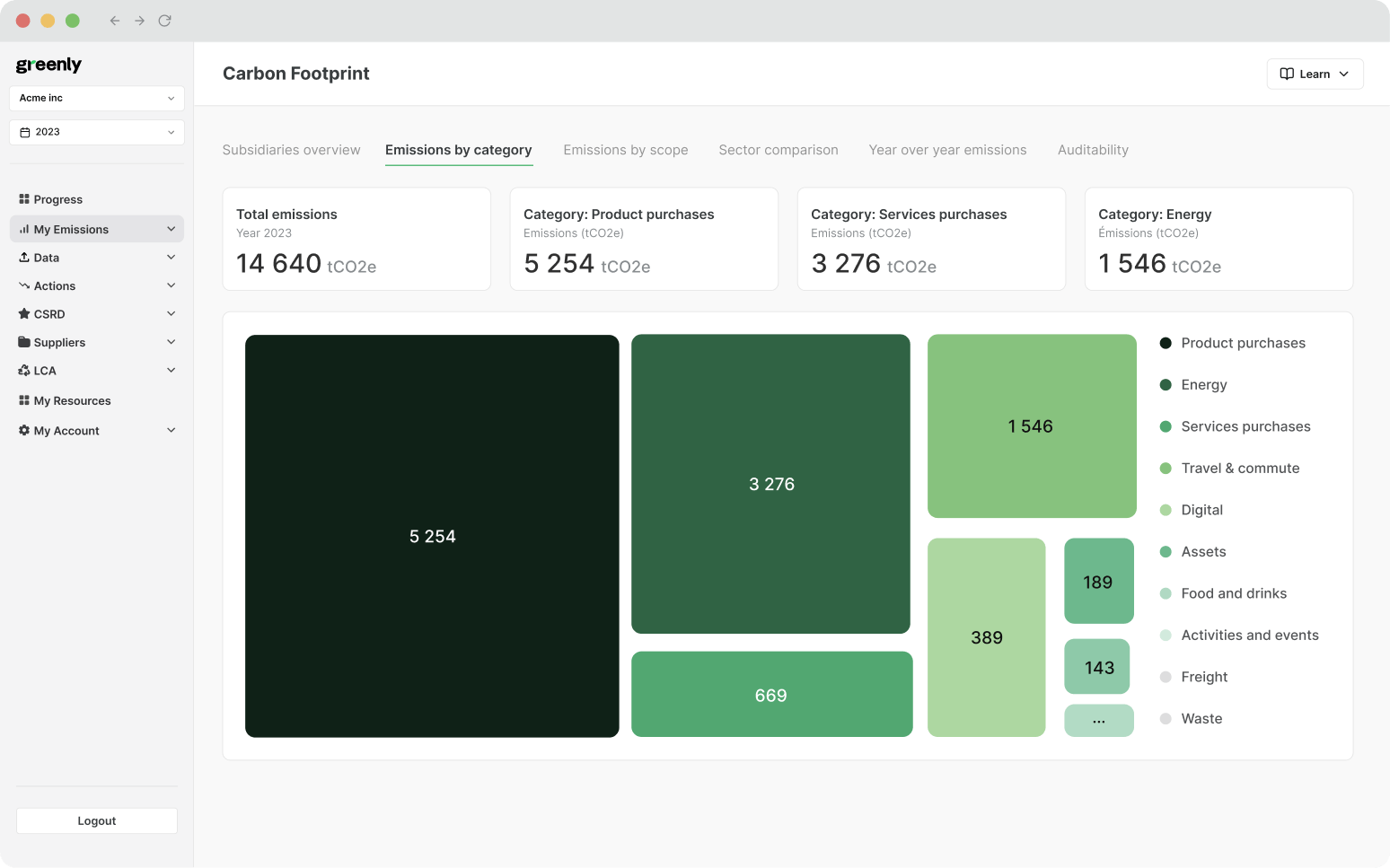
What are the 3 Pillars of Corporate Sustainability?
In this article, we'll explore what the 3 pillars of corporate responsibility are, why they're important, and how businesses can turn them into practical action.
ESG / CSR
Industries



Business sustainability has been around for decades, but these days, climate action is getting a laser-sharp focus in the midst of the climate crisis and newfound pressure to reduce greenhouse gas emissions.
This isn't surprising seeing that the visible impacts of climate change are intensifying faster than expected, which is making people become more anxious about what it means for the future and how we can combat climate change moving forward.
Business as usual implies a “no policy” change and no change to business operations. Of course, this is unrealistic – even in "normal" times where environmental sustainability and sustainable development aren't the most crucial factors.
💡However, change within our civil society is inevitable, whether it’s related to technology, financial markets, policy, or other factors.
Climate change is a little bit different, though – as it is a scientifically proven threat to most of our human systems. That's why there are globally binding agreements in favor of climate action such as the 2015 Paris Agreement.
In this context, it’s unlikely that climate change action will become less common over time – but become the opposite. In fact, many businesses are ramping up their efforts both in anticipation of stronger laws in the future and to prevent a backlash from increasingly climate-savvy shoppers.
For example, the telecoms industry is taking strides to minimize energy use of smartphones by: developing 5G networks, eliminating the use of chargers, adopting recycled packaging, and working towards net-zero goals.
However, consumers may struggle to distinguish which businesses are making a real impact versus which sustainability messages are mostly hype–or worse–greenwashing.
👉 In this article, we'll breakdown five reasons why until the end of the article to learn some of the strategies business can implement to reduce their emissions and overall environmental impact.
Keep reading to learn how your business can help in limiting global temperature rise with climate action and help contribute to a more sustainable future.

Climate change has never been more of an essential action than it is now, seeing as global efforts are on the rise to work towards net zero commitments and encourage international cooperation and mitigate efforts to reduce GHG emissions – and any industry can be taken as a primary example.
💡 For instance, smartphones, as with many other consumer goods – create the majority of their emissions from manufacturing. Consumers have very little control over this besides boycotts. This is why it’s imperative for businesses to take climate action, because the average person only has so much control over how much carbon dioxide is emitted by a business.
This is a question smartphone manufacturers, and all other businesses, are likely to ask in 2025 and for good reason. The pressure for climate action and to implement measurable mitigation efforts is intensifying from all angles.
The table below will provide more reasons on why climate action is important:
| Reason | Explanation |
|---|---|
| Regulatory Compliance | Governments worldwide are enforcing stricter environmental regulations, and businesses must comply to avoid fines and legal issues. |
| Reputation & Brand Value | Consumers are increasingly favoring eco-conscious brands, and businesses that prioritize sustainability can enhance their reputation and build customer loyalty. |
| Investor Expectations | Investors are prioritizing ESG (Environmental, Social, and Governance) criteria, and companies with strong climate strategies attract more funding opportunities. |
| Cost Savings | Implementing sustainable practices, such as energy efficiency and waste reduction, can lead to significant long-term cost savings. |
| Competitive Advantage | Businesses that take early climate action can gain a competitive edge by differentiating themselves in the market and meeting future demands ahead of their competitors. |
| Risk Management | Climate change poses risks such as supply chain disruptions and resource scarcity. Taking action helps businesses mitigate these risks and ensure operational resilience. |
| Employee Engagement | A strong climate action plan can attract and retain talent, as employees increasingly seek to work for companies that align with their values. |
| Customer Demand | Consumers are demanding more sustainable products and services, and businesses that fail to adapt may lose market share. |
| Innovation Opportunities | Sustainability efforts drive innovation, encouraging the development of new eco-friendly products, services, and business models. |
| Long-Term Viability | Taking climate action ensures the longevity of businesses by preparing for environmental and economic shifts in the future. |
Putting a price on carbon is one of the many ways governments can address climate change across the entire economy. In fact, worldwide, about 40 national and 20 regional jurisdictions had carbon emissions cap and trade or carbon taxes in place by 2014.
Even though the US still has not implemented a carbon trading or tax scheme federally, some states do have a carbon scheme in place – such as the state of California.
In preparation for these policies, many large corporations and investment firms use internal carbon pricing to prepare for future policies. Given their global impact, CO2 emissions could soon become a significant liability – which is shown with more recent efforts in the U.S., such as with the SEC Disclosure Rule.
💡 However, carbon pricing is not the only way that governments are adjusting to the financial risks presented by climate change. The Network for Greening the Financial System is a group of 121 global central banks developing financial tools like scenario analysis and stress tests to understand the impact of climate risks on the economic system.
In response to their findings, the UK and the EU have already established climate risk reporting mandates for large financial institutions and corporations. The aim is to expose their level of risk to the direct and indirect impacts of climate change. The US SEC has proposed a similar mandate, too.
Collecting data on CO2 emissions is the first step to climate action. Early action can include benefits such as setting yourself apart from competitors and improving your brand reputation, which can ultimately serve your businesses well.
Getting a head start also helps businesses transition smoothly to the newfound global response and expectations on behalf of national governments worldwide to adhere to reducing your company's carbon footprint. It takes time and planning to establish new business systems, invest in helpful assets, and develop supplier and partnering organization relationships to take climate action.
Even our best case scenario requires rapid decarbonization, so starting early will save businesses time and money in the future.
Business sustainability is quickly transforming from something that’s “nice to have” to something that indicates long-term business viability. ESG investors are scouring the voluntarily reported GHG data of companies to understand who will have staying power in the future.
Institutional investors often request ESG reporting for specific factors that materially impact business performance, as this helps institutional investors consider ESG factors as evidence of a lower risk investment in the long-term.
💡 In fact, climate change is extending the business cycle. Investors are more likely to shift away from concentrating on short-term profits towards long-term business strategies as a result.
Investors have support in the ideals, too – as 30 leading European VC firms have created the LFCA sustainability clause. This helps them evaluate sustainability across their shareholder agreements for closing deals with startups.
👉 Investors are more likely than ever to implement due diligence reviews to make sure companies are on track to meet their ESG targets.
Navigating today’s investment landscape can be a challenge for businesses, but a CO2 assessment is an easy first step to help provide investors with the information they're looking for – something Greenly can help you with!
Carbon assessments give investors clarity on the baseline performance compared to improvements overtime for CO2 emissions across a wide range of operational activities. Greenly can help you get started.
Green marketing is not a new trend. In fact, it has been around since the late 90s – the difference between eco-friendly products of those days and those of today is the number of customers who are “voting with their wallets” based on business sustainability.
Around the world, 85% of people have grown willing to pay more for eco-friendly and socially responsible products. Another critical difference for today’s customers is their willingness to go the extra mile in researching the validity of business sustainability claims. If customers cannot find adequate information on a company's environmental impact, they may lose trust in the brand – making transparency an essential component to taking overall climate action.
💡Maintaining trust requires transparency on social and environmental issues. ESG messaging only goes so far when journalists are actively exposing the inconsistencies between corporate promises and action.
Social media provides a convenient outlet for activist customers to express disappointment or even boycott companies who appear to be faking their impact or taking zero climate action. Therefore, it's easy to "expose" companies these days – meaning companies need to go the extra mile to certify and back up all of their claims to ensure they don't fall subject to greenwashing.
The upshot of all this is that customers are often willing to pay more for sustainable products: up to 20% more according to some estimates, and in return – ESG transparency also correlates with a 20% increase in sales revenue.
For companies, reducing packaging content, simplifying supply chains, and sourcing renewable energy can also produce financial savings for a company. Sounds like a win-win situation, right?
👉 Customers who care about sustainability are often deeply engaged with the brands they select. They find it important for the brands they shop from to reflect their beliefs and values.
However, communicating your environmental impacts does not happen overnight. It takes strong vetting of your credentials to make claims that are valid – and successful communication starts with a sustainability assessment.

Today’s employees seek alignment at their place of work, and for many – this means they prefer employers taking climate action over those that don’t. They see the mission, purpose, and company culture of their workplaces as a reflection of their own identity.
Meaningful work helps them feel more invested in the tasks they do everyday. After all, the majority of our lives are spent working.
💡To address this, companies that adopt sustainability within their mission and purpose can create a workplace that attracts dedicated, highly skilled talent. This improves the competitive advantage of a company overall, and it is an approach taken by companies such as IBM and Microsoft.
A Harvard Business Review conducted a study showing how sustainability correlates with employee retention, as loyalty from employees was 38% higher in companies that address sustainability as in comparison to those that didn’t.
The study also showed that productivity increased by 16% as employees felt more aligned with their company’s sustainability mission. This shows how sustainability contributes to workplace motivation.
In order to get the message across to employees, sustainable companies adopt a variety of strategies:
Employees are partners in reducing CO2 emissions, as both their contributions can make direct impacts towards meeting targets.
Having employees in your court in the workplace is a hugely valuable asset, as it ultimately improves not only the planet but the bottom line of business.

Companies’ reputations depend on more than just their own PR. In our information-rich society, media and NGOs actively assess company performance on their own terms.
💡 For instance, consumer goods companies are compared for everything from their use of palm oil, to their single-use plastic packaging – but if companies want to adhere global frameworks such as the Paris Agreement, switching to the use of sustainable packaging could prove worthwhile.
The most likely outcome of a bad evaluation from journalists and NGOs is the dreaded boycott. Campaigns from activist organizations can directly damage the reputation of a business, something that can take years to recover from.
Media outlets hold significant sway over consumer preferences and loyalty, which can help local communities make up their minds before a company can demonstrate that its pursuing efforts to reduce its environmental impact. Luckily, understanding these dynamics can help motivate businesses to take up more sustainable approaches that align with the broader demand of consumers.
Keep in mind that the journalists and NGOs target companies because of the real risks that unsustainable businesses present. The best solution is not to challenge their motives, but to lean towards reducing the underlying environmental risks.

You don't have to tackle climate action alone!
If reading this article on how taking climate action could help your own business in working towards net zero emissions, reducing dependency on fossil fuels, and more – you've found the right place to get started.
Greenly specializes in sustainable business strategy across a wide range of industries. We’re here to help you get started with a carbon assessment and take your strategy all the way through to implementation.
Ready to get started? Book a demo.
